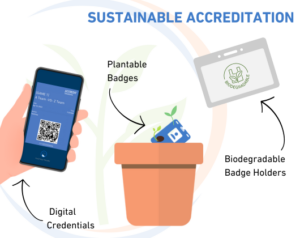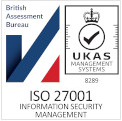In our previous discussions, we delved into sustainable accreditation options such as bamboo lanyards, composite accreditation cards, and eco-friendly paper badges.

As we conclude this series, we will explore even more innovative and environmentally conscious solutions that can significantly reduce the carbon footprint of events. This final blog will introduce plantable badges, biodegradable holders, and digital credentials as game-changing alternatives in the realm of sustainable accreditation.
Plantable Badges: Growing Sustainability
Plantable badges are an ingenious solution that merges functionality with environmental stewardship. These badges are made from seed paper – a type of biodegradable paper embedded with seeds. Once the event is over, attendees can plant their badges in soil, where they will decompose and grow into flowers, herbs, or vegetables. This not only eliminates waste but also contributes positively to the environment by promoting greenery.
The production of plantable badges involves using recycled paper and natural, non-toxic dyes, ensuring minimal environmental impact. They can be customised with event details and logos, maintaining the branding requirements without compromising on ecological values.
Biodegradable Badge Holders: Eco-Friendly Protection
Traditional plastic badge holders are notorious for their environmental impact. An excellent alternative is the use of biodegradable badge holders. Made from materials such as cornstarch or PLA (polylactic acid), these holders decompose naturally, reducing landfill waste and the overall carbon footprint.
Biodegradable holders are just as durable and functional as their plastic counterparts, offering a secure way to display badges while being kind to the planet. They can be composted after use, aligning with the principles of a circular economy and ensuring that every component of event accreditation can return to the earth without harm.
Digital Credentials: The Future of Accreditation
In an increasingly digital world, digital credentials are emerging as a highly sustainable alternative to physical badges and cards. By utilising smartphone technology and QR codes, event organisers can provide participants with digital badges that can be scanned and verified electronically. This eliminates the need for physical materials altogether. Digital credentials, especially with solutions like Accredit’s own E-Pass, offer multiple benefits: they are cost-effective, easily distributable, and enhance the user experience by integrating seamlessly with other digital tools. Moreover, they drastically reduce waste and the resources needed for production, making them a highly sustainable option.
Why Choose These Sustainable Alternatives?
The adoption of plantable badges, biodegradable holders, and digital credentials offers several compelling benefits:
1. Environmental Impact: These solutions significantly reduce waste and resource consumption, contributing to the preservation of natural habitats and reducing carbon footprints.
2. Cost Efficiency: Over time, sustainable practices can lead to cost savings through the reuse of materials and reduced disposal costs.
3. Positive Public Perception: Demonstrating a commitment to sustainability enhances brand reputation and aligns with the growing consumer demand for eco-friendly practices.
4. Innovation and Modernisation: Embracing digital credentials showcases an organisation’s forward-thinking approach and readiness to integrate modern technology.
Embracing a Greener Future
As we wrap up our series on sustainable event accreditation, the journey towards sustainability is ongoing, and every small step counts. By making informed choices about accreditation materials and processes, we can collectively contribute to a greener, more sustainable future.
Time to talk?
Get in touch if you are interested in talking all things accreditation – info@accredit-solutions.com





![EAS-Accredit-300dpi[22]](https://www.accredit-solutions.com/wp-content/uploads/2024/01/EAS-Accredit-300dpi22-300x156.png)

